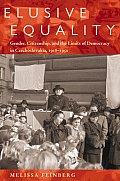Elusive Equality: Gender, Citizenship, and the Limits of Democracy in Czechoslovakia, 1918-1950

Melissa Feinberg’s must-read new book, Elusive Equality, chronicles in rich and sometimes dramatic detail the fascinating, though frequently distressing, events that marked Czech feminists’ struggle to implement the radical ideas of equality on which the Czechoslovak Republic was founded after the end of World War I. Tomáš Garrigue Masaryk, the first president of the new Republic, was a much-venerated utopian idealist who had studied John Stuart Mill with his American-born wife-to-be Charlotte Garrigue, whose last name he added to his own when they married. She translated The Subjection of Women into Czech and was a member of the influential Czech Women’s Club that brought together in Prague elite professional women such as educators, medical doctors, actresses and writers. Early Czech women’s groups tended to see Czech men as allies in the fight for political and national rights. Feinberg points out that a female candidate was elected to a provincial assembly even before woman suffrage was achieved in the state: “Czech men voted for a woman at the very time that Britain’s militant suffragettes were being brutalized and imprisoned.” Masaryk himself insisted that any true democracy must be based on recognition of the equality of all individuals.
The celebrated feminist leader Františka Plamínková praised "the old Czech virtues of love and democracy" and resistance to "any oppression." She and her colleagues did not make a distinction between supporting women and supporting democracy. Yet, despite their commitment to the ideal of gender equality, and despite the way that prominent male politicians promoted this idea, true equality of the sexes was never achieved in family law, job protection, or the problem of married women’s citizenship during the time of the Czech Republic. Deep-rooted attitudes to marriage and women’s duties prevailed. As one male reformer remarked, "I would not want...to change the civil code, which assigns a husband certain privileges...which we do not want to destroy."
Numerous Czech women, too, supported the old gender system, finding security in the fixed roles of wives and mothers. In the 1930’s a campaign for legalizing abortion aroused a backlash that seems to this reviewer quite similar to anti-ERA feelings in the United States in the 1970s. Politicians desperately trying to preserve the Czech nation in times of wars and economic crises were actually, concludes Feinberg, “in the process of hollowing out democracy itself.” Not even the sacrifices of Plamínková, executed as a resistance leader under the German occupation in 1942, and Milada Horáková, executed as an anti-Communist fighter in 1950, could preserve “the feminist hope for liberation via democracy.”
Plamínková was memorialized in 1947, but only after the fall of the Communist regime in 1989 was Horáková honored as a martyr to the cause of Czech freedom. Few today remember her work for women’s rights or, indeed, the whole history of the Czech feminist movement. Feinberg’s well-told cautionary tale serves as a reminder to readers and reformers everywhere that liberty for women and men is always in question and in danger.